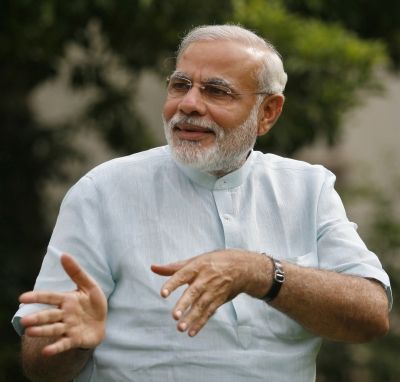 | « Back to article | Print this article |
 Bharatiya Janata Party’s prime ministerial candidate Narendra Modi’s belated attempt to project himself as a statesman and a man of reason in his interviews to ANI and TV9 is being viewed with dollops of scepticism by his critics and political opponents. Anita Katyal reports.
Bharatiya Janata Party’s prime ministerial candidate Narendra Modi’s belated attempt to project himself as a statesman and a man of reason in his interviews to ANI and TV9 is being viewed with dollops of scepticism by his critics and political opponents. Anita Katyal reports.
In sharp contrast to the belligerent tone Narendra Modi has been adopting in his public meetings in the ongoing election campaign, the BJP’s PM nominee made a conscious attempt to strike a conciliatory note to dispel the widely-held perception that he is authoritarian and does not brook dissent or tolerate criticism.
Emboldened by the strong undercurrent of support for him and the poll surveys predicting a clear victory for the BJP-led National Democratic Alliance, Modi spoke as if he has already taken residence at the Prime Minister’s official residence at 7, Race Course Road.
Although several phases of polling are yet to be completed and the votes are to be counted on May 16, Modi’s change of tone and demeanour appeared to suggest that the casting of ballot is but a mere formality. The message from the interviews was: the verdict is out, the people have already spoken.
It was perhaps for that reason that Modi toned down the political rhetoric whether it was with regard to the Congress party’s first family or the country’s neighbourhood.
“This a clear attempt to temper his image,” remarked Congress spokesperson Abhishek Singhvi, adding, “All I can say is sau choohe kha ke, billi Haj ko chali.”
Speaking in the same vein, his party colleague All India Congress Committee general secretary Shakeel Ahmed remarked, “This is nothing but an exercise in image building but the people of the country are not easily hoodwinked. They know what Modi stands for.”
Sceptic Congress leaders were not sure whether the BJP’s ideological mentor, the Rashtriya Swayamsevak Sangh, would allow Modi to be flexible and strike compromises when and if he occupies the prime minister’s kursi. Having worked assiduously for the victory of a Modi-led BJP, the RSS would not like its core ideology and agenda on issues pertaining to Hindutva, economy and the country’s dealings with Pakistan, to be diluted or compromised.
It was pointed that even a senior and seasoned leader like Atal Behari Vajpayee was under constant pressure from the RSS on Kashmir and on foreign investments and disinvestment in the garb of promoting “swadeshi.” The Agra talks between Vajpayee and Pakistan’s Pervez Musharraf were derailed by RSS hardliners in the NDA government like L K Advani.
The question that begs an answer is: Will Modi succeed in wading off RSS pressures like he was able to do in Gujarat? Sceptics believe it could prove difficult given the Sangh’s pro-active role in mobilising support in the ongoing elections.
While his political opponents are obviously not going to let up on their attack on him in an election season, Modi sounded unusually reasonable when he underlined that he would not indulge in vendetta politics even if it involved his bitter critics and political rivals -- Congress president Sonia Gandhi and vice-president Rahul Gandhi.
Stating that he would not go after the Gandhis or the Congress president’s son-in-law Robert Vadra, Modi said, “Let the law take its own course. There will be no role for Modi or a Modi government… Our focus will be positive, to fulfil the pledge made to the public. No government should work with a vindictive mindset. Democracy is not meant for that. Modi, in particular, should never do that. I have faced it for the last 12 years.”
Modi’s turnabout came days after he had publicly threatened a probe against Vadra while BJP leaders like Uma Bharati went as far as to declare that Sonia Gandhi’s son-in-law would be sent to jail for committing “several falsehoods” if her party formed the government at the Centre.
Modi was equally sober and mature in his remarks on foreign policy as he reiterated that Vajpayee’s policy of no first use of nuclear weapons would continue even as he spoke of friendly relations with India’s neighbours.
“Yeh Buddha ki dharti hai (This is the land of the Buddha). We want the world to be free of conflict. Our requirement is to be powerful but we do not want to suppress anyone with this power and want to use this only for our own defence…The no-first-use policy was an initiative of Vajpayee and there will be no compromise on that at all. This policy is a part of our ancient tradition,” Modi said in his latest interviews.
Modi’s statement comes shortly after the BJP’s election manifesto spoke about reviewing India's nuclear stance, which included Vajpayee’s commitment of no-first-use commitment and building a credible but minimum nuclear arsenal.
This again stands out in sharp contrast to Modi’s public utterances on China and Pakistan. Modi had attacked China’s expansionist mindset” in a public rally while underlining that India would not allow anybody to snatch Arunachal Pradesh.
“China should shed its expansionist policy and forge bilateral ties with India for peace, progress and prosperity of both the nations,” he had said, adding, “Arunachal Pradesh is an integral part of India and will always remain so. No power can snatch it from us. People of Arunachal Pradesh didn't come under pressure or fear of China”.
Similarly, while Modi has hit out at Pakistan for “beheading Indian soldiers” and acts of terrorism, the BJP manifesto asserted that India will pursue friendly relations in the neighbourhood. At the same time, it also spoke of increasing terror attacks in India by “Pakistan-backed terror groups”, underlining its “zero tolerance towards terrorism”.